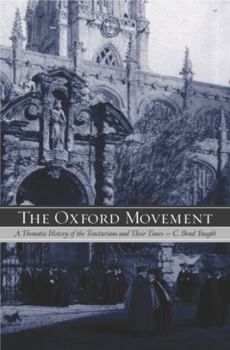The Oxford Movement: A Thematic History of the Tractarians and Their Times
Select Format
Select Condition 
Book Overview
Well over a century and a half after its high point, the Oxford Movement continues to stand out as a powerful example of religion in action. Led by four young Oxford dons--John Henry Newman, John... This description may be from another edition of this product.
Format:Hardcover
Language:English
ISBN:0271022493
ISBN13:9780271022499
Release Date:February 2003
Publisher:Penn State University Press
Length:200 Pages
Weight:0.85 lbs.
Dimensions:0.6" x 5.5" x 8.5"
Customer Reviews
2 ratings
Oxford Movement
Published by Thriftbooks.com User , 15 years ago
A good review of the motivations and foundation of the Oxford Movement. It is only a brief review but quite satisfactory for my purposes. The liturgical reforms of the 19th and 20th centuries in both the English and Roman churches, however; owe only a slight debt to the Tractarians whose movement appears to have been largely reactionary politically and antiquarian religiously. The movement lost momentum with the defection of Newman. More needs to be researched as to the relations between the founding members, particularly with regard to homosexuality. Bob
The Beginnings of Anglicanism
Published by Thriftbooks.com User , 15 years ago
C. Brad Faught has written a wonderfully helpful introduction to what was arguably the most important theological movement in the Church of England in the 19th century - and therefore, by extension, the most important theological movement in Anglicanism during the same time. In fact, one might go so far as to write that the Oxford Movement was, at bottom, the most important event within Anglicanism, both at home in England and abroad, since the time of the Anglican Reformations and Counter-Reformation of the 16th and 17th centuries. Faught focuses upon Politics, Religion & Theology, Friendship, Society and Missions, before concluding with a short afterword. The focus on politics is especially welcome; as he himself writes, "only through a proper understanding of the political life of Great Britain in the 1820s and 1830s can the origins and course of the Oxford Movement be understood" (1). What emerges is a movement that originally sought to defend the Church of England against both Roman Catholicism and various Dissenting or non-Anglican forms of Protestantism; the backdrop of this was "the complete destruction of the Anglican confessional state" (3). Over the course of the 1830s and early-mid 1840s, the Oxford Movement sought to make sense of Anglicanism as a coherent identity that had, by that point, been shorn from the privileged place that it had once held. By the end of the book, we see that what the Oxford Movement ultimately did was to give divergent answers to the questions of what it meant to be an Anglican in England when Anglicanism was no longer legally privileged as it once had been; for some, the answer was to convert to Rome while for others, the answer was to reinvent Anglicanism into a non-monarchical form of catholic Christianity. The longest section in the book is the second chapter, which discusses religion and theology, looking at everything from patristics to sacramental theology and ecclesiology. Faught has a solid sense as to what constituted normative Anglican theology up until the Oxford Movement began - or, perhaps, broke out - and he contextualizes the divergent opinions of the radicals in the movement, such as Froude and Newman (who later converted to Roman Catholicism), from both the more mainstream opinions of persons such as Keble and Pusey. These, then, are contrasted with the opinions of other Anglicans. However, Faught does not fall into the habit of reifying every set of opinions as some sort of distinct party in the Church of England, which is quite welcome, as the current party system in both the Church of England and global Anglicanism is ultimately a post-Oxford Movement development. The most interesting chapter for me, however, was the fifth, which looked at the growth and spread of the Oxford Movement's ideas and ideals around the then-burgeoning Anglican Communion. The idea that the Oxford Movement was intensely interested in evangelism may strike some people as odd; most Anglicans - partic





